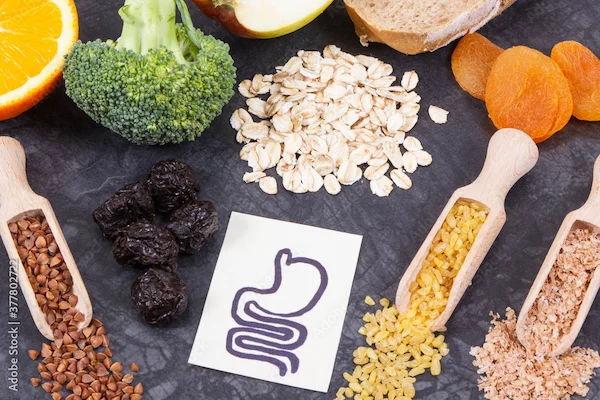How To Reduce Gas In Stomach?
Find quick relief from stomach gas. Discover dietary changes, home remedies, and lifestyle tips for a more comfortable gut.

Written by Dr.Sonia Bhatt
Last updated on 3rd Jul, 2025

Gas in the stomach is a frequent yet often uncomfortable issue that can disrupt daily life. From bloating and discomfort to sharp, painful cramps, excessive gas affects millions of people. Whether it’s triggered by certain foods, eating habits, or an underlying health condition, the discomfort can be frustrating. Fortunately, there are effective ways to manage and reduce gas, allowing you to regain comfort and control over your digestive health. In this guide, we’ll delve into the causes of stomach gas and offer practical strategies for relief.
What is Gas in the Stomach?
Gas in the stomach, also known as bloating or flatulence, refers to the accumulation of air or gases in the digestive system. The primary reason for this buildup is the natural process of digestion, where food is broken down in the stomach and intestines. However, when there is an imbalance in digestion, gas can accumulate to uncomfortable levels. Some of this gas is swallowed air, while others are byproducts of bacterial fermentation or the breakdown of food in the intestines. While it's normal to experience gas occasionally, frequent bloating or discomfort could be a sign of underlying digestive issues that may need attention.
Common Causes of Excess Gas in the Stomach
Understanding the underlying causes of excess gas can help in finding the most effective solutions. Here are some of the most common reasons for gas buildup in the stomach:
Dietary Choices: Certain foods are notorious for causing gas due to their high fibre content or specific sugars that are difficult to digest. Foods like beans, lentils, broccoli, onions, dairy products (for lactose-intolerant individuals), and carbonated drinks can lead to increased gas production.
Swallowing Air: Eating too quickly, chewing gum, drinking through a straw, or smoking can cause you to swallow excess air, leading to gas buildup in the stomach.
Digestive Disorders: Conditions such as irritable bowel syndrome (IBS), lactose intolerance, celiac disease, or gastrointestinal reflux disease (GERD) can cause an increase in gas production and bloating.
Gut Bacteria Imbalance: A disruption in the gut microbiome can lead to an overgrowth of gas-producing bacteria, contributing to bloating and discomfort.
Constipation: When stool remains in the colon for too long, it can cause bloating and gas as the bacteria in the colon continue to ferment undigested food.
Stress and Anxiety: Stress can slow down digestion, which may cause bloating and more gas. Anxiety can also make digestion harder, leading to discomfort and gas buildup.
Consult Top Gastroenterologist
Effective Ways to Reduce Gas in the Stomach
Managing and reducing gas in the stomach is most effective when combining dietary changes, lifestyle adjustments, and natural remedies.
1. Modify Your Diet
A balanced diet plays a key role in reducing gas. Some foods can cause excess gas, while others help with digestion. Here are some helpful tips:
Avoid Gas-Producing Foods: If you’ve identified certain foods that trigger gas, try to limit them or avoid them altogether. These foods typically include beans, lentils, cruciferous vegetables (like broccoli, cabbage, and cauliflower), onions, garlic, and dairy products (for those who are lactose intolerant).
Reduce High-Fiber Foods Gradually: Foods high in fibre, such as whole grains and some fruits, can be difficult for the body to digest. While fibre is important for digestive health, increasing fibre intake gradually allows your digestive system to adjust and prevents bloating.
Choose Easily Digestible Foods: Opt for foods that are easier on the digestive system, such as bananas, rice, yoghurt, and cooked vegetables. These foods are less likely to cause gas buildup.
Avoid Carbonated Beverages: Soda, sparkling water, and other carbonated drinks release carbon dioxide, which can increase the amount of gas in your stomach. Try to replace them with still water or herbal teas.
2. Eat Smaller, More Frequent Meals
Eating large meals can overwhelm your digestive system, leading to increased gas and bloating. Instead, try eating smaller, more frequent meals throughout the day. This helps your digestive system work more efficiently and reduces the chances of gas buildup.
3. Chew Food Slowly and Properly
Eating too quickly can lead to the swallowing of excess air, which increases the amount of gas in your stomach. By chewing your food slowly and thoroughly, you can reduce the air swallowed and aid the digestive process. This practice will also allow your stomach to break down food more effectively.
4. Increase Physical Activity
Regular physical activity helps promote digestion and can move gas through your digestive system. Even a short walk after a meal can reduce bloating and gas. Try to get at least 30 minutes of moderate exercise each day to support healthy digestion.
5. Try Probiotics
Probiotics are beneficial bacteria that help regulate the gut microbiome. A balanced gut flora can reduce the production of gas and bloating. You can incorporate probiotic-rich foods into your diet, such as yoghurt, kefir, sauerkraut, or kimchi, or take probiotic supplements. Research has shown that probiotics can reduce bloating and improve overall digestive health.
6. Use Herbal Remedies
Several natural remedies can help alleviate gas and bloating:
Peppermint Tea: Peppermint is known for its soothing effect on the muscles of the digestive tract, which can help alleviate bloating and gas. Drinking peppermint tea after meals can relax the stomach and provide relief from discomfort.
Ginger: Ginger is widely recognised for its digestive benefits, including its ability to reduce gas. It stimulates digestion, helping to ease bloating and nausea. You can enjoy ginger as a tea or incorporate it into your meals for maximum benefit.
Chamomile Tea: Chamomile has anti-inflammatory properties that can help calm the digestive system. Drinking chamomile tea may relieve gas and promote smoother digestion.
7. Consider Over-the-Counter Medications
If dietary and lifestyle changes don’t provide relief, you may consider over-the-counter medications that target gas and bloating. Some common options include:
Simethicone: This medication helps break down gas bubbles in the stomach, making it easier for the body to expel them.
Lactase Supplements: If you are lactose intolerant, taking lactase supplements with meals can help you digest dairy products more effectively and prevent gas buildup.
Antacids: If your gas is associated with acid reflux or GERD, antacids may provide relief by neutralising stomach acid.
8. Stay Hydrated
Staying well-hydrated throughout the day supports healthy digestion and ensures the digestive system operates efficiently. Proper hydration also helps prevent constipation, a common cause of bloating and excess gas.
9. Reduce Stress
Stress can worsen digestive issues like gas and bloating. Practices such as deep breathing, meditation, yoga, or mindfulness can help reduce stress and ease these symptoms. When the body is more relaxed, digestion tends to work more smoothly.
Conclusion
Excess gas is a common digestive concern that can cause discomfort, bloating, and self-consciousness. Thankfully, various strategies can help reduce gas and improve digestive health. By modifying your diet, adopting healthier eating habits, staying physically active, and managing stress, it’s possible to minimize gas and bloating. If these symptoms persist or become severe, it is essential to seek medical advice to rule out underlying conditions. Addressing these issues proactively can lead to better digestive comfort and overall well-being.
Consult Top Gastroenterologist
Consult Top Gastroenterologist

Dr. Santhosh Kumar
Gastroenterology/gi Medicine Specialist
7 Years • MBBS, MD (General Medicine), DNB ( Gastroenterology)
Bengaluru
VISTA SPECIALITY CLINIC, Bengaluru

Dr Harish K C
Gastroenterology/gi Medicine Specialist
15 Years • MBBS MD DM MRCP(UK) (SCE-Gastroenterology and Hepatology)
Bengaluru
Apollo Clinic, JP nagar, Bengaluru

Dr. Jatin Yegurla
Gastroenterology/gi Medicine Specialist
11 Years • MD (PGI), DM (AIIMS Delhi), FAGIE (AIIMS Delhi), ESEGH (UK), Gold Medalist
Hyderabad
Apollo Hospitals Jubilee Hills, Hyderabad
(625+ Patients)

Dr Rohit Sureka
Gastroenterology/gi Medicine Specialist
15 Years • MBBS, DNB General Medicine, DNB Gastroenterology
Jaipur
Apollo 247 virtual - Rajasthan, Jaipur

Dr. Chethan T L
General Physician/ Internal Medicine Specialist
5 Years • MBBS, MD, DNB (General Medicine)
Bengaluru
Apollo Medical Center, Marathahalli, Bengaluru
Consult Top Gastroenterologist

Dr. Santhosh Kumar
Gastroenterology/gi Medicine Specialist
7 Years • MBBS, MD (General Medicine), DNB ( Gastroenterology)
Bengaluru
VISTA SPECIALITY CLINIC, Bengaluru

Dr Harish K C
Gastroenterology/gi Medicine Specialist
15 Years • MBBS MD DM MRCP(UK) (SCE-Gastroenterology and Hepatology)
Bengaluru
Apollo Clinic, JP nagar, Bengaluru

Dr. Jatin Yegurla
Gastroenterology/gi Medicine Specialist
11 Years • MD (PGI), DM (AIIMS Delhi), FAGIE (AIIMS Delhi), ESEGH (UK), Gold Medalist
Hyderabad
Apollo Hospitals Jubilee Hills, Hyderabad
(625+ Patients)

Dr Rohit Sureka
Gastroenterology/gi Medicine Specialist
15 Years • MBBS, DNB General Medicine, DNB Gastroenterology
Jaipur
Apollo 247 virtual - Rajasthan, Jaipur

Dr. Chethan T L
General Physician/ Internal Medicine Specialist
5 Years • MBBS, MD, DNB (General Medicine)
Bengaluru
Apollo Medical Center, Marathahalli, Bengaluru



